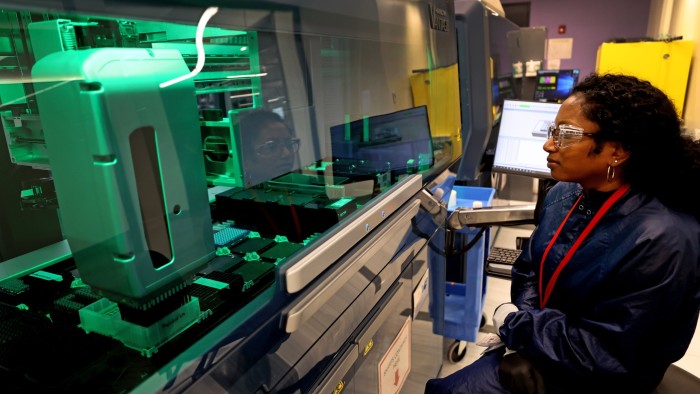The live music, free drinks and dancing at a big Boston biotech conference in June belied a stark reality: the city’s biotech sector is in trouble.
While some industries are still languishing since the Federal Reserve began raising interest rates in 2022, few have been hit as hard as the biotech sector by Trump administration policies.
Concerns about routine medicine approvals from the US Food and Drug Administration have frightened investors. The White House’s calls for lower drug prices have chilled deal activity so far this year. President Donald Trump’s attacks on Harvard University have included freezing federal research grants, posing a long-term threat to biotech.
Altogether, the Trump “policy uncertainty has resulted in significant turmoil and operational changes at biopharma companies”, Morgan Stanley said in a June report.
Meanwhile, the lack of investor appetite for new issues has closed the door for many biotechs waiting to go public. Typically, the biotech sector produces at least a dozen initial public offerings a year. But recently, “public [biotech] companies have gotten crushed”, said Dan Gold, president of Fairway Consulting Group, which does biotech recruiting. “There is no exit for venture people when they put in their money now.”
“We are actually seeing companies close, which is new,” Gold said. “I have not seen closures at this volume ever.”

For the first six months of the year, the number of biotech IPOs sank to its lowest level since 2012, according to Renaissance Capital. Venture capital firms brought no biotech companies to an IPO for the first time since 2011, Renaissance said.
“It is a very tough environment,” said Matthew Kennedy at Renaissance. “At this point, many of the biotechs themselves might be reluctant to move forward knowing they might have a hard time selling the deal.”
Vaccine-maker Moderna, which is headquartered on the north side of Boston’s Charles River, has seen its share price sink 27 per cent this year. The company, a top-20 employer in Boston’s Cambridge neighbourhood, is one of the worst performers in the S&P 500 this year.
A fifteen minute drive to the north, bluebird bio, which was a $10bn biotech company in 2018, was sold earlier this year for less than $50mn. Vor Biopharma, which is based three subway stops from Harvard University, said in May it would lay off most of its staff.
“What we are seeing in public and private markets is a number of companies that are actually folding,” Marian Nakada, a vice-president at Johnson & Johnson’s venture division, said at the conference. In June, Vor announced a $175mn fundraising as part of a licence agreement with a Chinese biotech company, but a Vor spokeswoman said the lay-offs were still proceeding.
Boston’s small biotech companies have powered the regional economy. Healthcare is Boston’s largest employment sector. Healthcare and social assistance jobs comprise 22 per cent of the city’s workforce, well above the 14 per cent national average, according to government statistics.
Boston has enjoyed a symbiotic relationship between the federal government and local universities — one that has been crippled by government funding cuts. The National Institutes of Health has halted grants to Harvard and other universities, hitting a fertile ground for biotech development.
Deals in biotech that are getting done are under pressure from Washington. Verve Therapeutics, which is based a short walk from Boston’s famous Fenway Park baseball field, was acquired by Eli Lilly in June for $1.3bn. But the deal was prompted in part by the uncertainty following the resignation of a top FDA official, Verve said in a June 25 regulatory filing. The company said its share price plunged after Peter Marks quit, raising concerns that FDA approvals could be delayed.
“The declining regulatory landscape for biopharmaceutical companies” had made raising cash “even more difficult”, Verve said.
Earlier in June, KalVista Pharmaceuticals, which is headquartered on the Charles River, said the FDA missed a regulatory deadline for one of its drug approvals. The delay was “due to heavy workload and limited resources” at the agency, KalVista said. A company spokeswoman declined to comment beyond its regulatory filings.
Boston’s June biotech conference was hosted by the Biotechnology Innovation Organization, the sector’s biggest lobbying group. To counter Trump’s policies, the organisation has increased its lobbying this year by hiring former Republican senator Richard Burr, who sponsored the FDA Modernization Act of 1997.
At the conference, FDA commissioner Marty Makary said the agency’s “morale is good and improving”.
But Gold at Fairway Consulting Group said he was having conversations almost every week with FDA employees looking for new jobs. “I think the morale is awful there from what I am hearing.”
Morale is also suffering at Harvard, Cambridge’s biggest employer. Promising biotech science that starts at such universities can be spun out into independent companies. Boston’s Beam Therapeutics, for example, was co-founded by Harvard professor David Liu. Beam has a licence agreement with Harvard and has paid the university $15mn since the company’s IPO.
“I definitely have long-term concerns about the trajectory of funding in the US and the stability of our science ecosystem,” Beam’s chief executive John Evans said in an interview.

